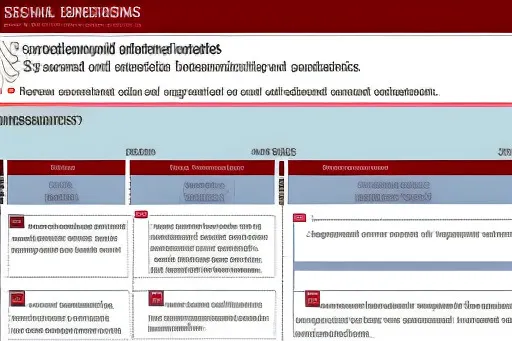Social Work Psychosocial Assessment Examples


In the field of social work, psychosocial assessments play a crucial role in understanding the complex needs and challenges faced by individuals. These assessments provide a comprehensive evaluation of an individual’s emotional, mental, and physical health, allowing social workers to develop appropriate intervention plans and support systems.
In this article, we will explore various examples of psychosocial assessments for social workers.
What is a Psychosocial Assessment?
A psychosocial assessment is a systematic process conducted by social workers to gather relevant information about an individual’s social, psychological, and environmental factors. It involves assessing various aspects of a person’s life, including their family dynamics, social relationships, work or education history, physical health, mental health, and any potential safety concerns.
The purpose of a psychosocial assessment is to identify the strengths and challenges that an individual faces and determine the most appropriate interventions and support services to address their needs. It provides a holistic understanding of an individual’s situation, allowing social workers to create personalized treatment plans and ensure the overall well-being of their clients.
Components of a Psychosocial Assessment
A psychosocial assessment typically consists of several key components, each providing valuable information about an individual’s life and circumstances. Here are some examples of the components commonly included in a psychosocial assessment:
-
Background Information: This section includes essential demographic details such as the individual’s name, age, gender, race/ethnicity, marital status, and living arrangements.
-
Presenting Problems: Here, social workers gather information about the primary concerns or issues that led the individual to seek help. It may include mental health symptoms, relationship difficulties, financial challenges, or any other problems affecting their overall well-being.
-
Psychiatric History: This component focuses on an individual’s mental health history, including previous diagnoses, medications, hospitalizations, and treatment outcomes. It helps assess the individual’s mental health status and informs the development of appropriate interventions.
-
Family History: This section explores the individual’s family dynamics, including family composition, relationships, and any history of mental health issues or substance abuse among family members. It provides insights into the individual’s upbringing and familial support system.
-
Social Support: Social workers assess an individual’s support systems, including family, friends, and community resources. It helps determine the level of social support available to the individual and identifies potential sources of strength and resilience.
-
Educational/Work History: This component focuses on the individual’s educational background and employment history. It helps assess their occupational skills, educational achievements, and potential barriers to employment or education.
-
Substance Use History: Here, social workers gather information about the individual’s history of substance use, including alcohol, drugs, or other addictive behaviors. It helps identify any substance abuse issues and informs the development of appropriate treatment plans.
-
Financial Situation: This component assesses the individual’s financial resources, including income, assets, debts, and any challenges related to finances. It helps determine the individual’s economic stability and the need for financial assistance or counseling.
-
Mental Status Examination: This section focuses on the individual’s current mental state, including their appearance, behavior, speech, mood, affect, thought processes, and cognitive functioning. It helps assess their mental health status during the evaluation.
-
Safety Assessment: Social workers evaluate the individual’s safety concerns, including any history of self-harm or thoughts of suicide, domestic violence, or other unsafe living conditions. It helps ensure the individual’s safety and guides the development of appropriate safety plans.
These are just a few examples of the components that may be included in a psychosocial assessment. The specific sections and questions may vary depending on the context and purpose of the assessment.
Benefits of Psychosocial Assessments
Psychosocial assessments provide numerous benefits to both social workers and their clients. Some of the key benefits include:
-
Comprehensive Understanding: By conducting a thorough and comprehensive evaluation, social workers gain a holistic understanding of their clients’ lives, needs, and challenges. This knowledge allows them to develop personalized treatment plans that address the individual’s specific concerns effectively.
-
Targeted Interventions: A psychosocial assessment helps social workers identify areas of strength and areas that require intervention. This knowledge enables them to develop targeted interventions that maximize the individual’s strengths while addressing their challenges.
-
Collaboration and Coordination: Psychosocial assessments involve collaboration and coordination with other professionals, such as healthcare providers, educators, and community organizations. This multidisciplinary approach ensures that the individual receives comprehensive and coordinated care.
-
Improved Outcomes: By conducting thorough assessments and developing personalized treatment plans, social workers can significantly improve client outcomes. The interventions provided based on psychosocial assessments are more likely to be effective and tailored to the individual’s unique needs.
In conclusion, psychosocial assessments play a vital role in social work practice. They provide social workers with a comprehensive understanding of their clients’ needs and help guide the development of personalized intervention plans.
By conducting thorough assessments, social workers can improve client outcomes and ensure the overall well-being of individuals seeking their assistance.
Recommended Product:
One highly recommended product that can greatly benefit social workers in conducting psychosocial assessments is the “Social Work Psychosocial Assessment Toolkit.” This toolkit includes a comprehensive collection of assessment tools, templates, and resources specifically designed to assist social workers in conducting thorough and effective psychosocial assessments. It provides step-by-step guidance and allows social workers to streamline their assessment processes while ensuring that all relevant information is gathered.
You can find the Social Work Psychosocial Assessment Toolkit on Amazon here.





